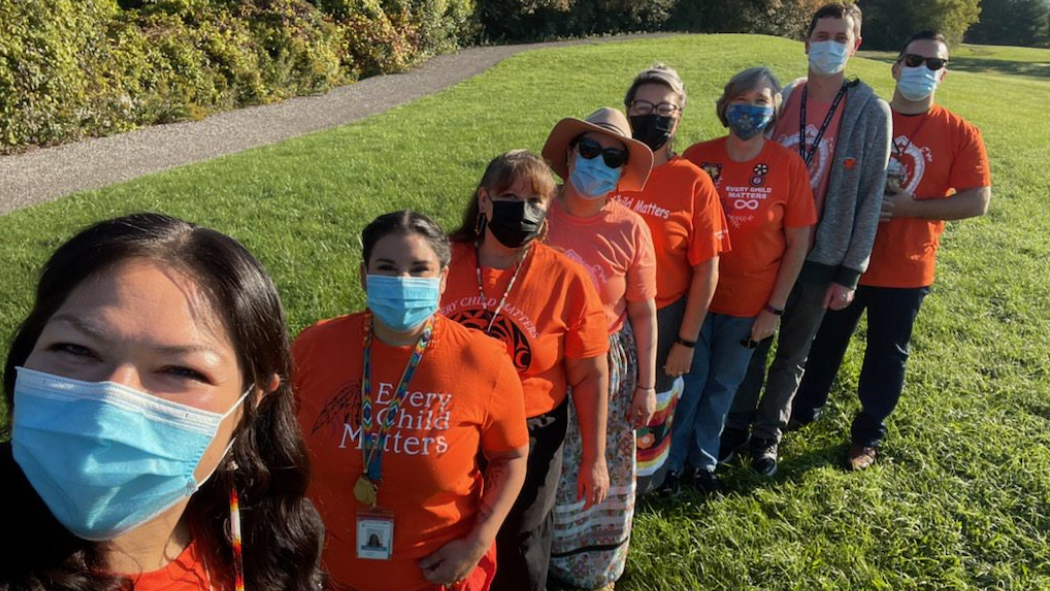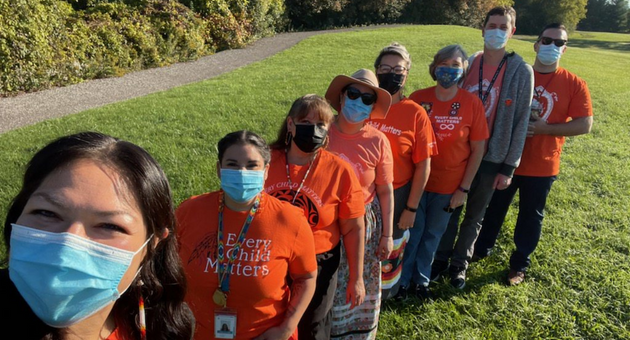
In order to address the legacy of residential schools and advance the process of Canadian reconciliation, the Truth and Reconciliation Commission made 94 calls to Action. Below are the seven calls to action under Health (numbers 18-23) and London Health Sciences Centre’s (LHSC) actions in response so far; there is still more work to do.
18. We call upon the federal, provincial, territorial, and Aboriginal governments to acknowledge that the current state of Aboriginal health in Canada is a direct result of previous Canadian government policies, including residential schools, and to recognize and implement the health-care rights of Aboriginal people as identified in international law, constitutional law, and under the Treaties.
LHSC is implementing an Indigenous Health team under a new department called Inclusion and Social Accountability. The Indigenous Health team members will be led by an Indigenous director who will guide this work through a culturally safe and traditional lens. (18)
19. We call upon the federal government, in consultation with Aboriginal peoples, to establish measurable goals to identify and close the gaps in health outcomes between Aboriginal and non-Aboriginal communities, and to publish annual progress reports and assess long term trends. Such efforts would focus on indicators such as: infant mortality, maternal health, suicide, mental health, addictions, life expectancy, birth rates, infant and child health issues, chronic diseases, illness and injury incidence, and the availability of appropriate health services.
The team will work together, along with other stakeholders within the health care system, to close the gaps in health outcomes between Indigenous and non-Indigenous communities by tracking our statistics as required for reporting purposes and establishing plans to set long term and short-term goals. (19)
20. In order to address the jurisdictional disputes concerning Aboriginal people who do not reside on reserves, we call upon the federal government to recognize, respect, and address the distinct health needs of the Métis, Inuit, and off-reserve Aboriginal peoples.
LHSC provides Indigenous healing services to all Indigenous, Metis and Inuit persons regardless of whether they live on or off reserve. (20)
21. We call upon the federal government to provide sustainable funding for existing and new Aboriginal healing centres to address the physical, mental, emotional, and spiritual harms caused by residential schools, and to ensure that the funding of healing centres in Nunavut and the Northwest Territories is a priority.
22. We call upon those who can effect change within the Canadian health-care system to recognize the value of Aboriginal healing practices and use them in the treatment of Aboriginal patients in collaboration with Aboriginal healers and Elders where requested by Aboriginal patients.
LHSC has worked with many local Indigenous community representatives to be inclusive of Traditional Ways of Knowing. This offers an opportunity to braid Western and Traditional Indigenous medicine together throughout a patient’s healing journey.
N’Amerind Friendship Centre has been providing access to Elders, Traditional medicine and ceremonial supports for patients in hospital 24/7 since 2008. (22)
In 2011 Southwestern Ontario Aboriginal Health Access Centre signed a memorandum of understanding with LHSC and provides Aboriginal Patient Navigation services. (22)
Since 2014, the Indigenous Cancer Program has been supporting patients with Indigenous Patient Navigation, an Indigenous Physician and an Indigenous Program Coordinator. (22)
A memorandum of understanding was signed in 2020 with Atlohsa Family Healing Services who provide access to Elders and knowledge keepers as well as Indigenous medicine and ceremony as requested. (22)
23. We call upon all levels of government to:
i. Increase the number of Aboriginal professionals working in the health-care field.
ii. Ensure the retention of Aboriginal health-care providers in Aboriginal communities.
iii. Provide cultural competency training for all healthcare professionals.
LHSC actively seeks Indigenous persons for Indigenous roles within LHSC and has several Indigenous employees. We also encourage people to self-identify to our team and engage with those of us in Indigenous specific roles. (23i)
San’Yas Cultural Safety Training is also offered to many staff. It is also recommended that staff take the health care related modules offered through Ontario Health with some discussion occurring around making this type of training mandatory in the future. (23iii)
24. We call upon medical and nursing schools in Canada to require all students to take a course dealing with Aboriginal health issues, including the history and legacy of residential schools, the United Nations Declaration on the Rights of Indigenous Peoples, Treaties and Aboriginal rights, and Indigenous teachings and practices. This will require skills-based training in intercultural competency, conflict resolution, human rights, and anti-racism.
The Indigenous Health Team at LHSC presents to learners about the impact of colonialism on the determinants of health for Indigenous patients. (24)
- Written by the Indigenous Health Team at LHSC
INDIGENOUS MENTAL HEALTH SUPPORTS
LHSC recognizes this is a distressing time for Indigenous peoples. The Indigenous Health team urges community members to access the following supports;
- The National Indian Residential School Crisis Line 24-hour crisis support line 1-866-925-4419
- The Indian Residential Schools Crisis Line is available 24-hours a day 1-800-721-0066
- Hope for Wellness 1-855-242-3310
